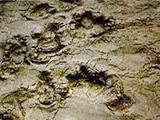
A brisk black market and competing bureaucracies could undermine the scientific pay-off from fossil-rich Liaoning Province in Northeast China.
Weak laws, experts say, have failed to halt the illegal excavation and trade in fossils, and scientific research is being hindered by confusing local rules, a report in the latest edition of Science magazine says.
It was less than a decade ago that paleontologists became enthralled with spectacular new fossils from Liaoning.
The steady stream of finds from these rich beds has given them an impressively detailed picture of life 125 million years ago.
"You can't find such a rich reserve elsewhere," says Wang Xiaolin, a noted paleontologist with the Institute for Vertebrate Paleontology and Paleoanthropology (IVPP) under the Chinese Academy of Sciences. Wang has led the institute's fieldwork at Liaoning for the past seven years.
"It's been a gold mine."
Unfortunately, many local residents also discovered the "gold mine," which is approximately 400 kilometres from Beijing. Although China's laws prohibit individuals from unearthing or trading valuable fossils, the province does have licenced stores that sell less important fossils.
"In western Liaoning, each county has an active fossil market that may contain illicit materials of great value," said Wang. Precious fossils can also be purchased easily on the Internet, he said.
Zhao Yibin, director of the fossil administration office with the Liaoning Land and Resources Bureau, insists that "we have basically stopped illegal excavation."
Recent incidents, however, appear to back up claims that the problem is getting worse.
Last month, Australian authorities seized 20 tons of Chinese fossils worth some US$3 million in a raid outside Perth in Western Australia. The cache included fish and dinosaurs from Liaoning, says John Long of the Western Australian Museum in Perth.
IVPP scientists acknowledge that research is also hindered since laws are enforced in an arbitrary and opaque manner. A 2001 provincial law requires applicants to obtain a series of signatures from various local authorities.
Obliged to deal with a different set of administrators, an IVPP team had its application turned down last autumn after having set up camps and waiting three months for a permit.
(China Daily August 3, 2004)
|

